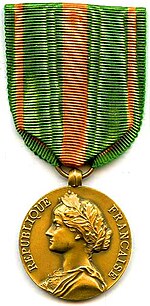Médaille des Évadés
| Escapees' Medal | |
|---|---|

Escapees' Medal (obverse)
|
|
| Awarded by |
|
| Type | Military medal |
| Awarded for | Successful escape from internment |
| Status | Active |
| Statistics | |
| Established | 20 August 1926 |
| Precedence | |
| Next (higher) | Ordre des Arts et des Lettres |
| Next (lower) | Croix du combattant volontaire 1914-1918 |
|
Ribbon for the Escapees' Medal |
|
The Escapees' Medal (French: Médaille des Évadés) is a military award bestowed by the government of France to individuals who were prisoners of war and who successfully escaped internment or died as a result of their escape attempt. The "Escapees' Medal" was established by a 1926 law, intended to honour combatants not only of the First World War, but also of the Franco-Prussian War of 1870. Its statute was later amended to include combatants of the Second World War and later conflicts.
The award criteria for the Franco-Prussian War was established by law on 2 October 1926 and read as follows:
The award criteria for the First World War were established by decree on 7 April 1927 and read as follows:
The award criteria for the Second World War were long in coming. A decree of 7 February 1959 allowed for award of the medal, followed by an Order on 20 May 1959 and detailed instructions on 10 July 1959. The medal was bestowed to persons able to prove a successful escape:
To persons able to prove:
These actions are only considered for bestowal of the medal if they occurred between 2 September 1939 and 15 August 1945.
The medal can be awarded to both French citizens and foreign nationals serving in the ranks of the French armed forces. Civilians and members of the military killed, or who have died as a result of wounds received during an escape attempt, are automatically awarded the medal.
A decree of 28 December 1981 states that "any person eligible for the "Escapees' Medal" is asked to put forward a request".
There is only one military unit that has been awarded the medal, the 2nd Dragoon Regiment, which received it in 1945, after the entire regiment decided to escape the German occupation of Vichy France (Case Anton) in November 1942. Some members of the regiment went into the resistance, and others joined the Free French in Africa; one officer eventually reached Algiers still carrying the regimental standard.
...
Wikipedia
